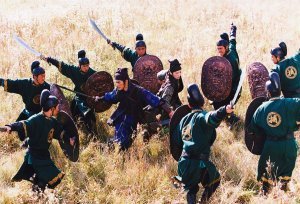House of Flying Daggers

|
The House of Flying Daggers is a 2004 wuxia (swordplay and chivalry) film directed by Zhang Yimou. It begins in China 859 A.D where the Tang Dynasty is in decline. The Emperor’s government, crippled by corruption, no longer controls the land, culminating in an underground alliance formation: ‘The House of Flying Daggers'. Where the tone set for a film suggests themes of conflict through politics and struggles for power, it turns a surprising corner when Yimou fuses a martial arts action-drama with tragic romance. What makes House a truly unique wuxia experience is the narrowed scope of the film to the two protagonists that fall in love whilst the grand scale of epic battle and politics shifts to the majestic background.
Two cops, Leo and Jin are given the task of finding the leaders of the revolutionary faction, the Flying Daggers. A beautiful blind dancer working at a brothel, Mei, is suspected as one of the members and Jin attempts to gain her trust in the hopes of her leading him to her leader. He, inadvertently, falls in love with her. What at first seems like a simplistic love story grows and emerges with unexpected twists into a grand story of love, deceit and conflict that merges easily with a striking cinematic magnificence of the scenery.
An honourable mention must go to the brilliant cinematic vision House truly is. The martial art battle scenes are smooth, adrenaline-fuelled and the slow-motion fragments of the scenes stunning. With love, betrayal and deception interwoven, the film overwhelms the senses with its gaudy, elegant encapsulation of the artistry of the landscapes. It is a conflict between love and duty in an authentic blizzard of colour, action, passion, love, battle and dance.
It is, simply put, a feast for the eyes, and a story for the heart.
Yasmin Mahdy
It would be lazy to say, “if you liked Crouching Tiger Hidden Dragon, you will love this”. While Zhang Yimou’s film may share many similarities with Ang Lee’s masterpiece, at its core House of Flying Daggers is a far more ferocious beast. Bursting with action, drama, romance, mystery and even dance, this film is a unique patchwork of cinematic spectacle.
Set towards the end of China’s historic Tang Dynasty, blind dancer Mei (Ziyi) becomes embroiled in a cataclysmic adventure when government police officers Jin (Kaneshiro) and Leo (Lau) arrest her for her involvement with a rebel group named The Flying Daggers. Like a Chinese version of Robin Hood’s merry men, the revolutionary faction steals from the rich to give to the poor. Supposedly the daughter of the group’s deceased leader, Mei is interrogated by Leo and Jin as they attempt to find out who is now leading the extremely prosperous group of vigilante thieves and warriors.
With superb performances all round, specifically Ziyi’s entrancing portrayal, the film’s operatic pace grips you from the offset and doesn’t let you go. For most movies this would be an achievement in itself, but this film does so much more. Truly a feast for the senses, story comes second to the hypnotic visuals, the lighter-than-air choreography, and the perfectly punctuating soundtrack, all of which envelop the viewer in a wonderfully spellbinding but gravely human world.
If you’re looking to lose yourself for a couple hours, then look no further. House of Flying Daggers will pick you up and put you down, fling you from the white stillness of its snow-blanketed forests to the lawless colour of its palatial settings, and all the while you’ll find yourself caring more and more for the people on screen. This film has style in abundance, and more than enough substance to keep everybody happy.
Luke Woellhaf
Zhang Yimou has gone Hollywood. All his life he's been making intensely emotional art house films like Raise The Red Lantern. Suddenly, around the turn of the millennium he decided to engage in an experiment that was Hero. Confident that the experiment was a success, his next film was the remarkably titled House of Flying Daggers (the Chinese title Shi Mian Mai Fu means 'Ambushed From Ten Directions').
China was rarely as prosperous as during the colourful Tang Dynasty (one of the Renaissance periods of Chinese history). But around mid-9th century the Tang Dynasty was coming to an end, and at this point uprisings against the emperor was commonplace. The House Of Flying Daggers was the most successful and elusive of the troublemakers. Into this background comes the story of the playboy officer Jin (Kaneshiro) and the blind dancer Mei (Ziyi), who are both double-crossing each other yet find that their feelings may be more powerful than their motives.
The film is visually spectacular, with every frame being painted by vivid, contrasting colours, whether by the costumes of the period or the surreal scenery (some in China, most of it in Ukraine). The martial arts sequences are everything we ask for and more, including a dance sequence by Zhang Ziyi that is worth the admission price alone (really), and an almost operatic scene of the lovers desperately trying to escape an ambush in the plains.
What makes the experience even more intense are the sound effects. Every sword swing, dagger twist, stride of a horse or struck bamboo is amplified whenever the director wants us to pay them attention.
The music by Japanese composer Shigeru Umebayashi is beautiful, and wholesomely compliments the emotions of the characters; many times we find the characters faced with choices, and as they hesitate, the music swells up and becomes the narrative itself. Sounds pretentious, but it isn't - you'll see.
Mark my words, this is not a film you forget easily.
Sebastian Ng
More Information | Back to Previous Schedule | This Season | BBFC Classification Guidelines
Screenings of this film:
| 2004/2005 Spring Term – (35mm) |
| 2010/2011 Autumn Term – (35mm) |
| 2013/2014 Autumn Term – (35mm) |
| 2019/2020 Spring Term – (35mm) |


